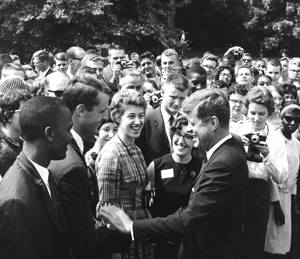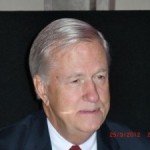Where Were You When John F. Kennedy Was Shot? Mark Wentling (Honduras1967-69); Togo (PC Staff 1970-73) & Niger (PC Staff 1974 – 77)

JFK Greeting PCVs, Summer of 1962
November 22 is a sacred day of remembrance for me. It was on this day fifty years ago that President John F. Kennedy was assassinated in Dallas. Even after all these years, I feel the dramatic events of that day as if they occurred yesterday. When this day comes and I think about how the life of our president was brought to a tragic end by an assassin’s bullets, I cannot hold back my tears.
Like everyone else who was alive at that time, I can remember clearly where I was and what I was doing when I heard the news that the president had been shot. I was eighteen years old at the time and struggling with my first semester of college at Wichita State University. I worked and lived at a mortuary-ambulance company. The job had kept me up all night and early on the November 22 I had courses to attend. I had just arrived at the dormitory I shared with some other guys and I was looking forward to crashing in the narrow bed in my cubicle. I was desperate to get some much needed sleep.
I was on the verge of sleeping when I heard a number of the guys entering, as was usually the case after an ambulance run. But this time it was different. I could hear these hard-core paramedics crying. I told myself that they must have come from a particularly terrible traffic accident. The crying continued, so I got up to go see what had happened. As I approached the group, they looked at me with tears flowing from their eyes and distraught faces that seared my memory. Seeing their extraordinary grief, brought tears to my eyes before I even knew what had happened.
I stood next to them crying for a few minutes before one of them cleared his throat enough to tell me, “The President has been shot.”
I was stunned. I refused to believe the words he had just uttered. Then another one said, “He was shot and it does not look like he will live.” This was more than my weak physical condition could absorb. I wanted to run away to a place where there was not this kind of terrible news. I quickly went from initial denial of what I heard to feeling like I had been floored by a knock-out punch the national tragedy that was unfolding in Dallas.
This was more than I could take. I felt like I could not breathe. I needed to be alone and get some fresh air. I grabbed my jacket and headed for the exit. My head was spinning as I tried to deal with the gravity of the news coming out of Dallas. I was almost stumbling as I reached the side of the street and sat down on a bus bench. The normally busy street was totally quiet and I did not see another person out and about, although it was a beautiful sunny day. It was as if the ghastly news about the president had slammed the world into silence and all had come to a standstill.
I sat on the bench for a long time, trying to come to grips with a world that had been turned upside down by the shooting of the president. I felt numb all over. I searched for the stability and strength I needed to return to my sleeping cubicle. I wanted more time alone to deal in my own way with the death of the president. I rose slowly and hobbled back to the dorm. As I entered, I could hear the small black-and-white TV in the front lounge blaring away. I believe it was Walter Cronkite announcing in a solemn voice, “It has been confirmed. The President is dead.”
Those words sent me bawling into my bed. I covered my head with my pillow as I tried to shut out the world. I did not want to hear anymore. I could not take anymore. Somehow, exhaustion drove me into a deep sleep on that Friday afternoon and I did not wake up until the next day. I joined the guys to watch the non-stop programming on TV about the Kennedy assassination. We were pleased that they had already arrested the alleged assassin, Lee Harvey Oswald. The next day we joined the nation in being shocked by the killing of Oswald by Jack Ruby. We asked ourselves. “Will this sick madness ever stop?”
President Kennedy was a great inspiration for me. I took to heart much of what he said, especially when he said, “Ask not what your country can do for you, but what you can do for your country.” With these words in mind I applied four years later to join the Peace Corps that President Kennedy had put in place in 1962. This fateful act led to my entering the Peace Corps in February 1967 and being assigned as a rural community development volunteer in Nueva Ocotepeque, Honduras.
One of my first duties as Peace Corps Volunteer was to pay a courtesy call on the town’s mayor. I was well received by the mayor who said, “We are happy to have at long last our very first Kennedy’s child.”
This was the first time I had been referred to as Kennedy’s Child and I felt honored, as I really saw myself doing what President Kennedy would want me to do. During my two years in this community, I was often referred to as one of Kennedy’s children. The people of this very Catholic country revered President Kennedy like a saint. In most houses I visited, there would be a picture of Jesus Christ hanging on the wall on one side of a cross and a photo of President Kennedy on the other side.
I also saw the impact of Kennedy in the community in other ways. I was involved with a child feeding program that was supported by the Alliance for Progress, another Kennedy initiative. I also worked with a credit and savings group that was made possible by the funding flowing from the US in support of this alliance. Kennedy’s spirit and his concrete actions gave new hopes to the people of Honduras and across Latin America.
It was in the spirit initially kindled by Kennedy that I continued my Peace Corps service in Africa and went on to this present day doing humanitarian work in Africa. To this day, I still consider myself as one of Kennedy’s children. Looking back over the past half century on this sad Memorial Day for one of our greatest presidents, I cannot but be very thankful for what Kennedy was able to achieve during his relative short time in office. What Kennedy did way back then has made all the difference in my life. I will always mourn his untimely death, but I will remain eternally grateful to him for making my life what is has been.
Mark G. Wentling was a Peace Corps Volunteer in Honduras 1967-69 and Togo 1970-73, and in  Gabon and Niger as a member of Peace Corps staff. He then joined USAID in 1977 and served in Niamey, Conakry, Lome, Mogadishu and Dar es Salaam before retiring from the U.S. Senior Foreign Service in 1996. Since retiring, he has worked for USAID as its Senior Advisor for the Great Lakes, and as its Country Program Manager for Niger and Burkina Faso. He has also worked in Africa for U.S. Non-Governmental Organizations and he is currently Country Director for Plan in Burkina Faso. On September 20, he marked 42 years in Africa. He has worked in, or visited, all 54 African countries. He has six children and hails from Kansas. His novel, Africa’s Embrace, has just been published this year.
Gabon and Niger as a member of Peace Corps staff. He then joined USAID in 1977 and served in Niamey, Conakry, Lome, Mogadishu and Dar es Salaam before retiring from the U.S. Senior Foreign Service in 1996. Since retiring, he has worked for USAID as its Senior Advisor for the Great Lakes, and as its Country Program Manager for Niger and Burkina Faso. He has also worked in Africa for U.S. Non-Governmental Organizations and he is currently Country Director for Plan in Burkina Faso. On September 20, he marked 42 years in Africa. He has worked in, or visited, all 54 African countries. He has six children and hails from Kansas. His novel, Africa’s Embrace, has just been published this year.
4 million though its 41% possession of Innova, Azines. If you are fun of sky games get yourself
t software today. I’ve urged the majority of my close friends to watch
live tv for pc channels using this program and the’ve all have commented how awesome it is to now have access
to about 3500 Hi-def channels at the mere price of half a cable tv monthly subscription.